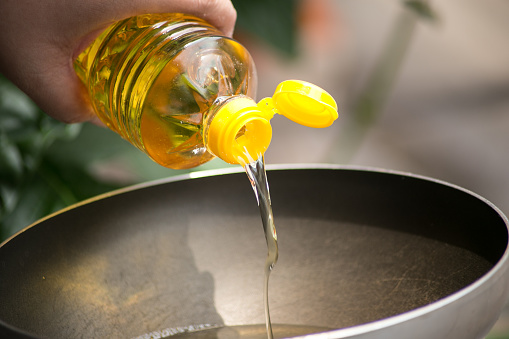In many kitchen pantries, a bottle of vegetable oil is a common sight. If that bottle has been sitting untouched for some time, questions about its usability might arise. Regular users of vegetable oils might feel they know their way around them, but understanding their shelf life and recognizing spoilage’s early signs can prove beneficial.
Lifespan of Vegetable Oil
Different types of vegetable oils, be it soybean, sunflower, or peanut oil, have a common shelf life. When stored appropriately, an unopened bottle can remain fresh for up to two years.

However, the clock starts ticking once it’s opened, with quality declining as months pass. Typically, such oils retain their prime condition for up to a year, dependent on storage conditions.
Factors Affecting Oil Quality
It’s essential to note that oil quality isn’t solely about its expiry date. Flavor profiles can shift, sometimes becoming rancid. Exposure to elements like air, light, and moisture can speed up this decline. To maintain its condition, oil should be kept in a cool, dark place, and the container should be securely closed after use.
Reading the Label
A common feature on many vegetable oil bottles is the “best if used by” date, not to be mistaken for an expiration date. This label suggests that for the freshest flavor, the oil should be used by this date. However, with proper storage, the oil can be used safely for several months beyond this date.
Signs Your Vegetable Oil May Not Be Fresh
A few indicators can signal that your oil might not be in the best state:
- Color Change: Fresh vegetable oil typically has a light hue. Any significant darkening can be a sign of deterioration.
- Mold Formation: If the bottle’s seal shows mold growth, it often indicates bacterial activity, primarily if the oil has been exposed to moisture or heat.
- Odor: A change in smell, especially if it turns stale or damp, indicates the oil might not be fresh.
- Taste: A final confirmation can be through a taste test. Any bitterness or off flavor confirms the oil’s deteriorated state.
Potential Risks
Consuming slightly off oil might not result in immediate health concerns. However, continual consumption of such oils introduces compounds that can increase health risks over time, like heart disease or even cancer. Additionally, using the same oil multiple times for cooking can degrade its quality at a faster rate.
Proper Storage Techniques
With a variety of vegetable oils available, a few fundamental storage rules can be applied. Oil remains freshest when stored in a cold, dry, and dark environment. While not all oils need refrigeration, some, like sesame oil, benefit from cooler temperatures, extending their freshness.
Conclusion
Vegetable oil’s usability is not indefinite. The key to its longevity is proper storage combined with vigilance for signs of spoilage. If any doubt arises regarding its freshness, always trust your senses. Using fresh oil not only guarantees flavorful dishes but also ensures a healthy cooking environment.

Editorial Staff
Our writers, editors, content managers, and SEO specialist. We all take part in crafting amazing articles. We spend hours ensuring that each article is based on facts, researched, and thorough. You'll never want to click the back button to look for more answers other than here!
